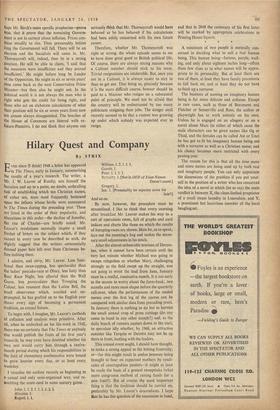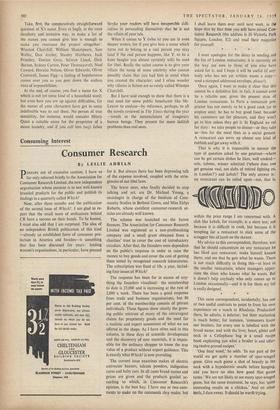Hilary Quest and Company
By STRIX
EVER since (I think) 1948 a letter has appeared in The Times, early in January, summarising the results of a year's research. The writer, a Mr. J. W. Leaver of Ruislip, sets himself the harmless and up to a point, no doubt, enthralling task of establishing which ten Christian names, of either sex, were most frequently bestowed Upon the infants whose births were announced in The Times during the preceding year. These are listed in the order of their popularity, and alterations in this order—the decline of Jennifer, the rise of Charles—are briefly noted. Mr. Leaver's revelations normally inspire a small freshet of letters on the subject which, if they cannot in every case be described as arch, do Slightly suggest that the writers ceremonially donned paper hats left over from Christmas be- fore inditing them.
I admire, and envy, Mr. Leaver. Less func- tional than swan-upping, less spectacular than the ladies' pancake-race at Olney, less lusty than Boat Race Night, less alluvial than the Wall Game, less protocolaire than Trooping the Colour, less resonant than the Lutine Bell, the small observance which, unaided and un- prompted, he has grafted on to the English year Shows every sign of becoming a permanent tradition, an annual fixture.
To begin with, I imagine, Mr. Leaver's methods of collation and analysis were primitive. After all, when he embarked on his life-work in 1948, there was no certainty that The Times or anybody else would publish the fruits of his first year's research; he may even have doubted whether his own zest would carry him through a twelve- month period during which his responsibilities in the field of elementary mathematics were bound to grow heavier every day, or at least every Weekday.
I visualise his earliest records as beginning in casual and only semi-organised way, and re- sembling the score-card in some nursery game.
John. 1. 1. 2. 1. 1. 1. 1. 2. 1. Aloysius. 1.
Rupert. 1. 1. William. 1. 2. 1. 1. 1.
Gareth. I.
Peter. 1.1. 1.1.
StcLet.ls.y. 1. Not in OED of Xiian Names.
Doesn't count.]
Gregory. 1.
Ian. 1. [Presumably no separate score for lain?] And so on.
By now, however, the procedure must be streamlined. I like to think that every morning after breakfast Mr. Leaver makes his way to a sort a operations room, full of graphs and card indices and charts like those on which the results of bumping-races are shown. Here he, so to speak, lays out the morning's bag and makes the neces- sary small adjustments in his totals.
After the almost unbearable tensions of Decem- ber, when it cannot have been certain until the very last minute whether Michael was going to escape relegation or whether Mary, challenging strongly as the field swept up the straight, was not going to wrest the lead from Jane, January must be a restful, ruminative month. It is too early in the season to worry about the form-book; two months and more must elapse before the quarterly call-over, when the performances of the seeded names over the first leg of the course can be compared with similar data from preceding years. In January there is nothing to do but to harvest the small annual crop of press cuttings (do any come to hand in any other month?) and, as the daily bunch of runners canters down to the start; to speculate idly whether, by 1968, an attractive outsider like Tarquin or Deirdre may not be up there in front, battling with the leaders.
This annual event ought, I should have thought, to make a strong appeal to the betting fraternity; or—for this might result in undue pressure being brought to bear on expectant mothers by syndi- cates of unscrupulous punters—it might at least be made the basis of a genteel sweepstake (what more congruous method of raising funds for a new font?). But of course the most important thing is that the tradition should be carried on, preferably by Mr. Leaver's descendants. I hope that he has this question of the succession in hand,, and that in 2048 the centenary of his first letter will be marked by appropriate celebrations in Printing House Square.
A minimum of two people is normally con- cerned in deciding what to call a feal human being. This human being—furious, purple, wail- ing, and only about eighteen inches long—offers them few clues as to what names will be appro- priate to its personality. But at least there are two of them, at least they have family precedents to fall back on, and at least they do not have to think up a surname.
The business of naming an imaginary human being is far more delicate and arduous. Except in rare cases, such as those of Beaumont and Fletcher or Somerville and Ross, the author or playwright has to work entirely on his own. Unless he is engaged on an allegory or on a novel about Mars (in either of which cases the male characters can be given names like Og or Thud, and the females can be called Aie or Une) he has got to fit his imaginary human being out with a surname as well as a Christian name; and his choice becomes more restricted with every passing year.
The reason for this is that all the time more and more names are being used up by both real and imaginary people, You can only appreciate the dimensions of the problem if you put your- self in the position of a writer who has conceived the idea of a novel in which (let us say) the main conflict is between X, the clean-limbed proprietor of a small steam laundry in Loamshire, and Y, a prominent but lascivious member of the local beagling set. Take, first, the comparatively straightforward question of X's name. Even to been, in the most desultory and tentative way, to make a list of the names you cannot give him is enough to make you renounce the project altogether : Winston Churchill, William Shakespeare, Sam Weller, Dan Archer, Stanley Matthews, Jack Priestley, Dorian Gray, Selwyn Lloyd, Dick Barton, Sydney Carton, Peter Thorneycroft, Noel Coward, Horatio Nelson, Oliver Edwards, Oliver Cromwell, James Pigg—a feeling of hopelessness comes over you as you peer down the endless vista of impossibilities.
In the end, of course, you find a name for X which is not yet some kind of a household word; but even here you are up against difficulties, for the names of your characters have got in some indefinable way to suit them. No person of true sensibility, for instance, would consider Hilary Quest a suitable name for the proprietor of a steam laundry, and if you call him (say) Jabez Stryke your readers will have insuperable diffi- culties in persuading themselves that he is not the villain of your, tale. When it comes to V (who is) you are in even deeper waters, for if you give him a name which turns out to belong to a real person you may (and if the real person happens, like Y, to be a keen beagler you almost certainly will) be sued for libel. Really the safest course• is to give your villain the name of some celebrity who cannot possibly claim that you had him in mind when you created the character; and I often wonder why villains in fiction are so rarely called Winston Churchill.
But I have said enough to show that there is a real need for some public benefactor like Mr. Leaver to analyse—by reference, perhaps, to all the novels reviewed in The Times during the year —trends in the nomenclature of imaginary human beings. They present far more ticklish problems than real ones.



































 Previous page
Previous page